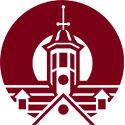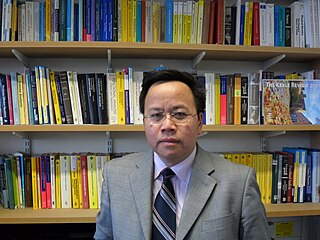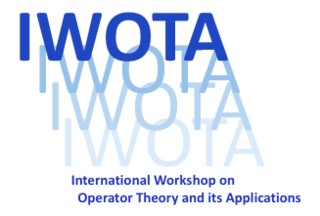Related Research Articles
The International Congress on Medieval Studies is an annual academic conference held for scholars specializing in, or with an interest in, medieval studies. It is sponsored by the Medieval Institute at the Western Michigan University in Kalamazoo, Michigan, and is held during the first half of May. The Congress is the largest annual gathering in the field, regularly attracting over three thousand registered participants from all over the world. The 50th annual conference took place in 2015.
The American Literary Translators Association (ALTA) is an organization in the United States dedicated to literary translation. ALTA promotes literary translation through its annual ALTA conference and year-round events structured around the creation of high-quality art. ALTA also administers awards to recognize excellence in translation and provides fellowships and mentorships to support emerging translators.

The Canadian Mathematical Society is an association of professional mathematicians dedicated to the interests of mathematical research, outreach, scholarship and education in Canada. It serves the national community through the publication of academic journals, community bulletins, and the administration of mathematical competitions.

The Conference and Workshop on Neural Information Processing Systems is a machine learning and computational neuroscience conference held every December. Along with ICLR and ICML, it is one of the three primary conferences of high impact in machine learning and artificial intelligence research.
Society for Industrial and Applied Mathematics (SIAM) is a professional society dedicated to applied mathematics, computational science, and data science through research, publications, and community. SIAM is the world's largest scientific society devoted to applied mathematics, and roughly two-thirds of its membership resides within the United States. Founded in 1951, the organization began holding annual national meetings in 1954, and now hosts conferences, publishes books and scholarly journals, and engages in advocacy in issues of interest to its membership. Members include engineers, scientists, and mathematicians, both those employed in academia and those working in industry. The society supports educational institutions promoting applied mathematics.

Mesh generation is the practice of creating a mesh, a subdivision of a continuous geometric space into discrete geometric and topological cells. Often these cells form a simplicial complex. Usually the cells partition the geometric input domain. Mesh cells are used as discrete local approximations of the larger domain. Meshes are created by computer algorithms, often with human guidance through a GUI, depending on the complexity of the domain and the type of mesh desired. A typical goal is to create a mesh that accurately captures the input domain geometry, with high-quality (well-shaped) cells, and without so many cells as to make subsequent calculations intractable. The mesh should also be fine in areas that are important for the subsequent calculations.

The Mexican Academy of Sciences(Academia Mexicana de Ciencias) is a non-profit organization comprising over 1800 distinguished Mexican scientists, attached to various institutions in the country, as well as a number of eminent foreign colleagues, including various Nobel Prize winners. The organization, which encompasses exact and natural sciences as well as the social sciences and humanities, is founded on the belief that education, based on the truth of scientific knowledge, is the only means, in the short and long term, of achieving the development of the Mexican spirit and national sovereignty.
ACM SIGACT or SIGACT is the Association for Computing Machinery Special Interest Group on Algorithms and Computation Theory, whose purpose is support of research in theoretical computer science. It was founded in 1968 by Patrick C. Fischer.
The Mathematical Optimization Society (MOS), known as the Mathematical Programming Society (MPS) until 2010, is an international association of researchers active in optimization. The MOS encourages the research, development, and use of optimization—including mathematical theory, software implementation, and practical applications.

The Omohundro Institute of Early American History and Culture (OI) is an independent research organization located in Williamsburg, Virginia, sponsored by William & Mary and Colonial Williamsburg. Founded in 1943, the OI supports the scholars and scholarship of vast early America—a term used to describe the capacious histories of North America and related geographies, including foundational histories of indigenous peoples, the scale and impact of transatlantic slavery, and multidimensional European colonization and settlement, from the 1450s to the 1820s.
The European Symposium on Algorithms (ESA) is an international conference covering the field of algorithms. It has been held annually since 1993, typically in early Autumn in a different European location each year. Like most theoretical computer science conferences its contributions are strongly peer-reviewed; the articles appear in proceedings published in Springer Lecture Notes in Computer Science. Acceptance rate of ESA is 24% in 2012 in both Design and Analysis and Engineering and Applications tracks.
The Association for Laboratory Phonology is a non-profit professional society for researchers interested in the sound structure of language. It was founded to promote the scientific study of all aspects of phonetics and phonology of oral and sign languages through scholarly exchange across disciplines and through the use of a hybrid methodology. The founding and honorary members are Amalia Arvaniti, Mary Beckman, Cathi Best, Catherine Browman, Jennifer S. Cole, Mariapaola D'Imperio, Louis M. Goldstein, José Ignacio Hualde, Patricia Keating, John Kingston, D.R. Ladd, Peter Ladefoged, Janet Pierrehumbert, Caroline Smith, Paul Warren, and Douglas Whalen. The Association is an international body open to scholars world-wide, and currently has over 100 members.

Gui-Qiang George Chen is a Chinese-born American-British mathematician. Currently, he is Statutory Professor in the Analysis of Partial Differential Equations, Director of the Oxford Centre for Nonlinear Partial Differential Equations, and Director of the EPSRC Centre for Doctoral Training in Partial Differential Equations at the Mathematical Institute, and Professorial Fellow at Keble College, located at the University of Oxford, as well as Life Member of Clare Hall, University of Cambridge.
Research in Computational Molecular Biology (RECOMB) is an annual academic conference on the subjects of bioinformatics and computational biology. The conference has been held every year since 1997 and is a major international conference in computational biology, alongside the ISMB and ECCB conferences. The conference is affiliated with the International Society for Computational Biology. Since the first conference, authors of accepted proceedings papers have been invited to submit a revised version to a special issue of the Journal of Computational Biology.
The Annual ACM-SIAM Symposium on Discrete Algorithms (SODA) is an academic conference in the fields of algorithm design and discrete mathematics. It is considered to be one of the top conferences for research in algorithms. SODA has been organized annually since 1990, typically in January. SODA is jointly sponsored by the ACM Special Interest Group on Algorithms and Computation Theory (SIGACT) and the SIAM Activity Group on Discrete Mathematics, and in format is more similar to a theoretical computer science conference than to a mathematics conference.

Foundations of Computational Mathematics (FoCM) is an international nonprofit organization that supports and promotes research at the interface of mathematics and computation. It fosters interaction among mathematics, computer science, and other areas of computational science through conferences, events and publications.

International Workshop on Operator Theory and its Applications (IWOTA) was started in 1981 to bring together mathematicians and engineers working in operator theoretic side of functional analysis and its applications to related fields. These include:

Scott Alan Mitchell is a researcher of applied mathematics in the Center for Computing Research at Sandia National Laboratories.

The International Linear Algebra Society (ILAS) is a professional mathematical society organized to promote research and education in linear algebra, matrix theory and matrix computation. It serves the international community through conferences, publications, prizes and lectures. Membership in ILAS is open to all mathematicians and scientists interested in furthering its aims and participating in its activities.
The IMS/ASA Spring Research Conference (SRC) is an annual conference sponsored by the American Statistical Association (ASA) Section on Physical and Engineering Sciences (SPES) and the Institute of Mathematical Statistics (IMS). The goal of the SRC is to promote cross-disciplinary statistical research in engineering, science and technology. The topics broadly cover a wide range of research areas including design and analysis of experiments, uncertainty quantification, computer experiment, machine learning, quality control, reliability modeling, and statistical computing, with the applications in business, industry, environment, information technology and advanced manufacturing. The SRC also regularly has invited sessions organized by editors of the top journals including Technometrics, Journal of Quality Technology, and SIAM/ASA Journal on Uncertainty Quantification. The SRC has the tradition to support students and postdocs with scholarships to selected participants who present contributed talks or posters at the conference.
References
- ↑ Ruiz-Gironés, Eloi; Sevilla, Rubén; Moxey, David, eds. (2023), SIAM International Meshing Roundtable, 2023, SIAM, ISBN 978-3-031-40594-5 .